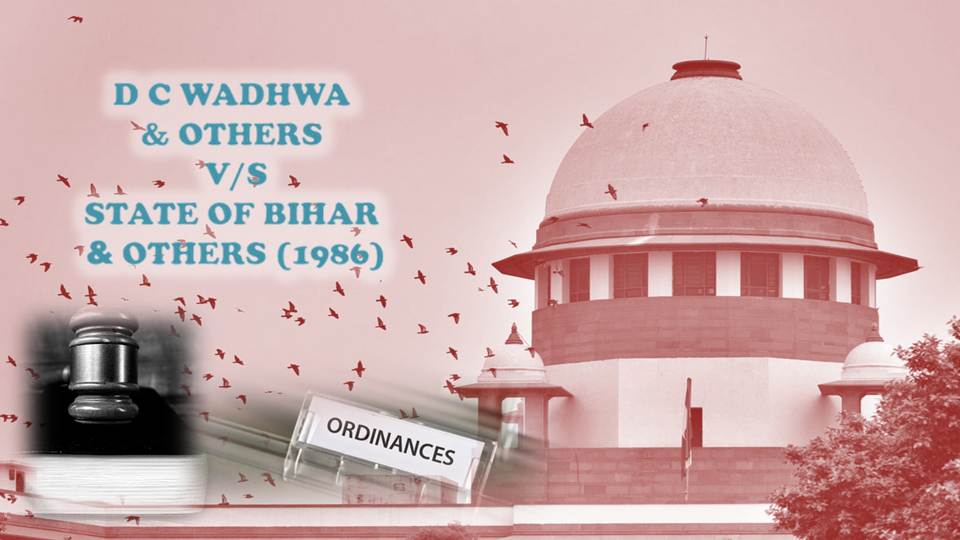DC Wadhwa vs the State of Bihar case: In the constitutional scheme of things, presidents and governors are informally called rubber stamps. Primarily because they are not directly elected by the people and have less legal power compared to elected representatives. That does not mean that they do not use their authority. Governors have done this frequently in the past, and in one case, the Supreme Court had to intervene to prevent abuse of power.
DC Wadhwa vs the State of Bihar – Ordinances in Apex Court
Between 1967 and 1981, the Bihar governor promulgated 256 ordinances in total. Ordinances can loosely be termed as “temporary laws” for seven and a half months. After that, the state legislature, or Parliament, has to sit and vindicate the contents of the ordinance. If they fail to do it after six weeks of the first sitting of the legislature, the ordinance is invalid.
However, Bihar Governor continued to repromulgate those ordinances. A lot of them continued for 10–14 years. One of them was repromulgated 39 times in total. The matter went to the Apex Court. There is an economics professor named D.C. Wadhwa presented his book titled “Repromulgation (sic.) of Ordinances: Fraud on the Constitution of India.”
He contended that the Bihar governor abused his power under Article 213 of the Constitution. Dr. Wadhwa was also joined by a few disaffected individuals of these ordinances.
Also read: Romesh Thappar: The case that defines the flexibility of the Constitution
Every citizen has locus standi with respect to the Constitution
The Bihar government tried to argue that Dr. Wadhwa, who is located outside of Bihar, should not be allowed to be a party to that. The Apex Court debunked this argument by citing S.P. Gupta case. In that case, the Supreme Court had clearly stated that if a person observes a violation of constitutional machinery by public officials, he can approach the case. Dr. Wadhwa’s petition under Article 32 was upheld.
Defining the ordinance-making power and its cross-check
The next question was checking the constitutionality of these ordinances. For this purpose, the SC looked into the differential roles given to the Governor and Ministry. The Apex Court held that the power conferred on the governor under Article 213 is to be exercised only in cases of emergency.
Quote: “Ordinance promulgated by the Governor to deal with a situation which requires immediate action and which cannot wait until the legislature reassembles, must necessarily have a limited life.”
Regarding limited life, the Court abridged that Article 174 mandates that the legislature should meet twice a year. It means that the government should change the ordinance into an act within a short span of time, which is fixed to not go beyond six weeks.
Also read: Ismail Farooqui vs Union of India – When Supreme Court blew the lid off Indian secularists
The government was literally speechless in court
The Supreme Court then went harsh on the Bihar administration, telling them that such power cannot be allowed to be “perverted to serve political ends.” It literally schooled the administrations that it is the duty of the legislature to form a law as they are direct representatives of people.
Repromulgation of ordinances for such an extended period of time is nothing less than giving legal validity to those ordinances. Interestingly, these ordinances effectively become law without any direct sanction by lawmakers. Though it has the sanction of the executive, the Supreme Court rightly termed this phenomenon as usurpation of power by the executive and a subterfuge.
To reach these conclusions, the Apex Court relied on precedents set in Gajapati Narayan and P. Vajravelu cases.
Also read: Delhi high court puts an end to the freebies in MBBS
Knowing how the Court’s words are interpreted, it also gave a system in which the re-promulgation power can be used. The court ruled that an ordinance could only be re-promulgated only when the legislature is short of time in passing the act on the ordinance.
Indirectly, the Apex Court also told state governments to learn from the President. Similar ordinance power is also available to the President under Article 123; however, by the time the DC Wadhwa vs the State of Bihar was decided, the Union’s executive director had not passed a single ordinance.
Also read: When Ram Manohar Lohia took on Nehru over the First Amendment and won
Always contentious
Ordinance-making power has always been debatable. In pre-independence India, Governor Generals had the power to legislate. It was enabled by Sections 42 and 43 of Government of India Act 1935. After a fierce debate in the Constituent Assembly, it was brought into the Constitution with provisions for a fixed time period.
However, the political compulsions of unpopular leaders do not listen to any Constitutional Safeguards. Even to this day, Ordinance making power is being misused. But, we can thank Dr. D.C. Wadhwa for minimising it.
Support TFI:
Support us to strengthen the ‘Right’ ideology of cultural nationalism by purchasing the best quality garments from TFI-STORE.COM
Also Watch:
https://www.youtube.com/watch?v=PyAnhsFANis
